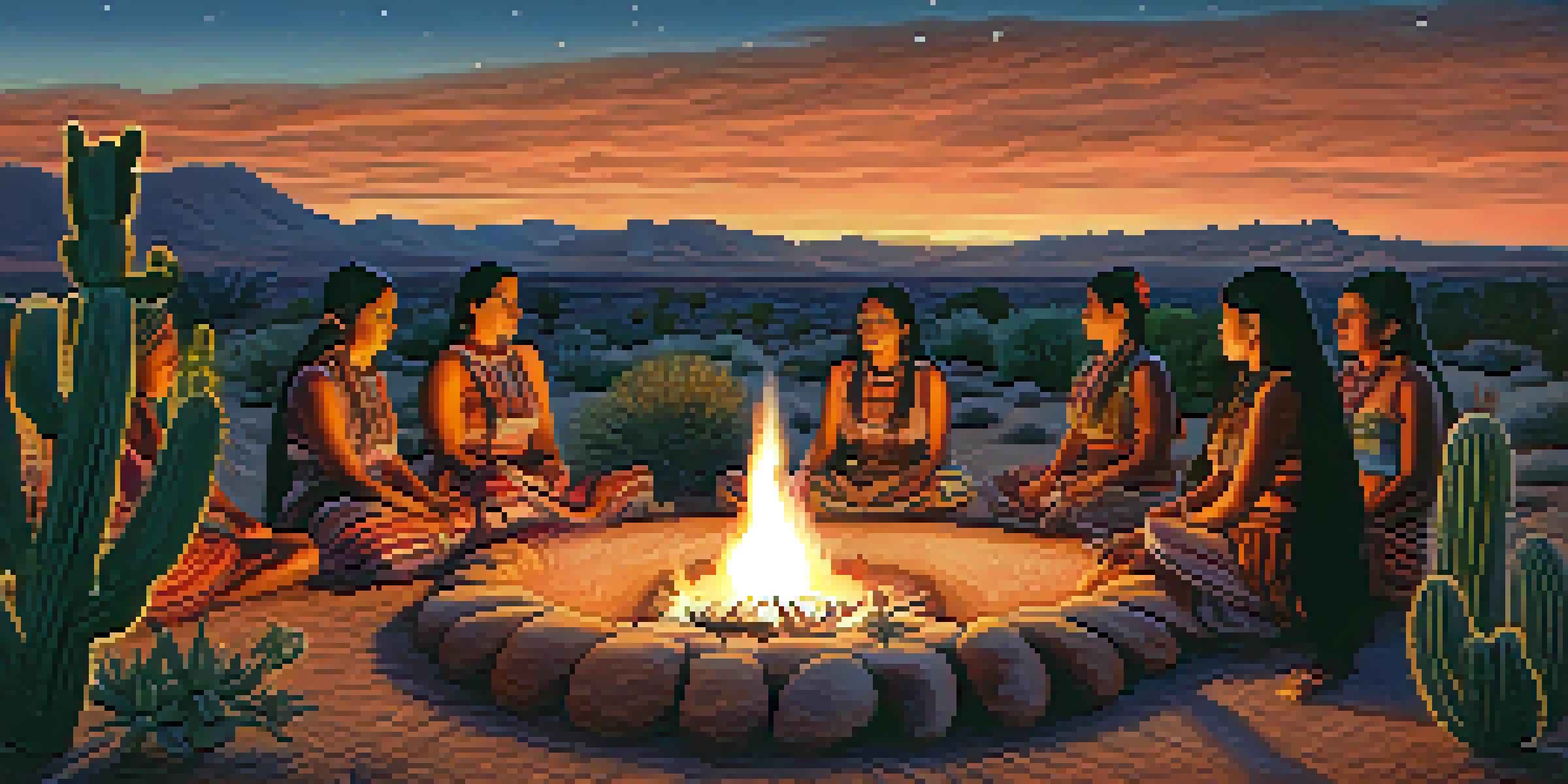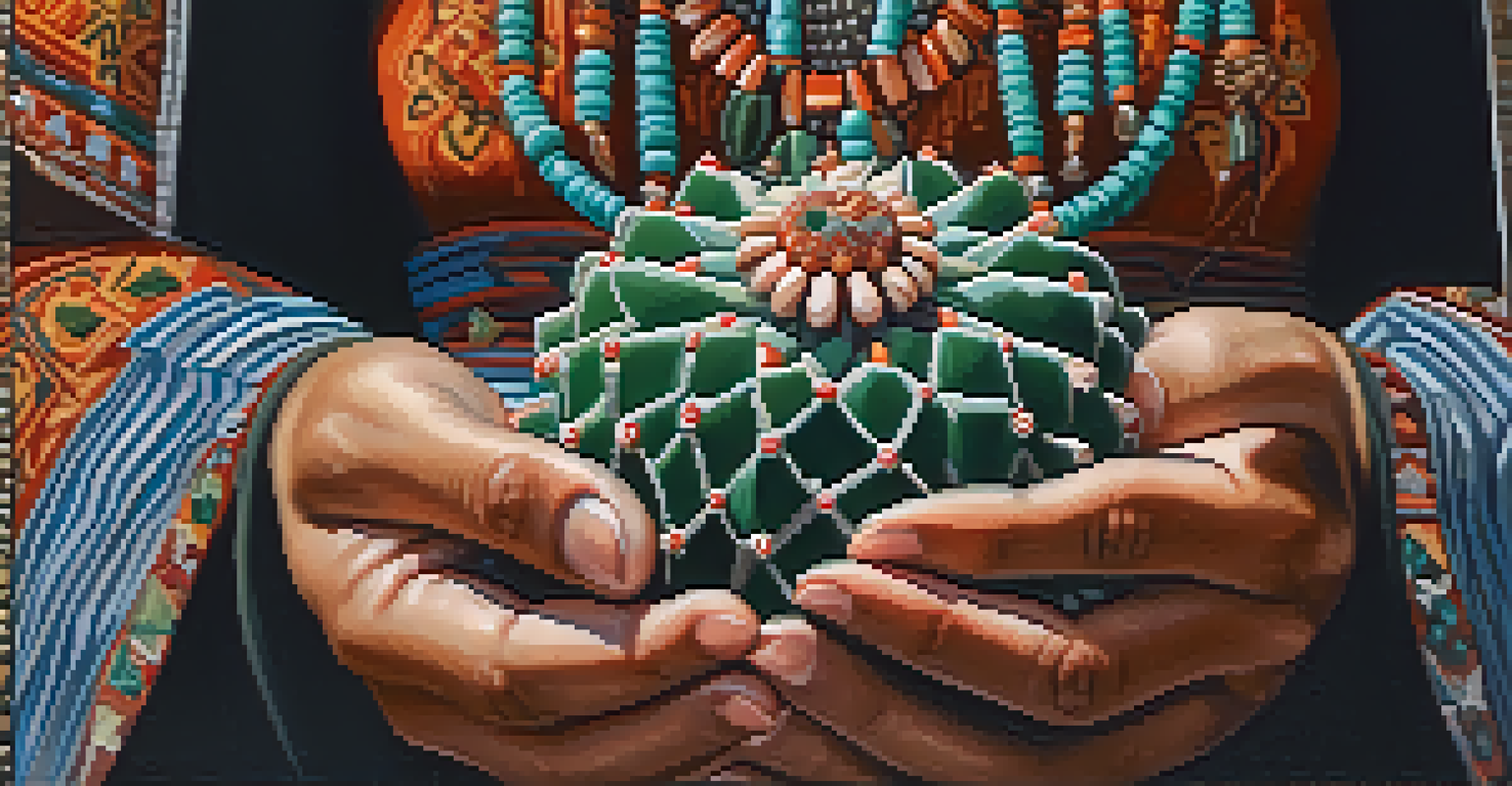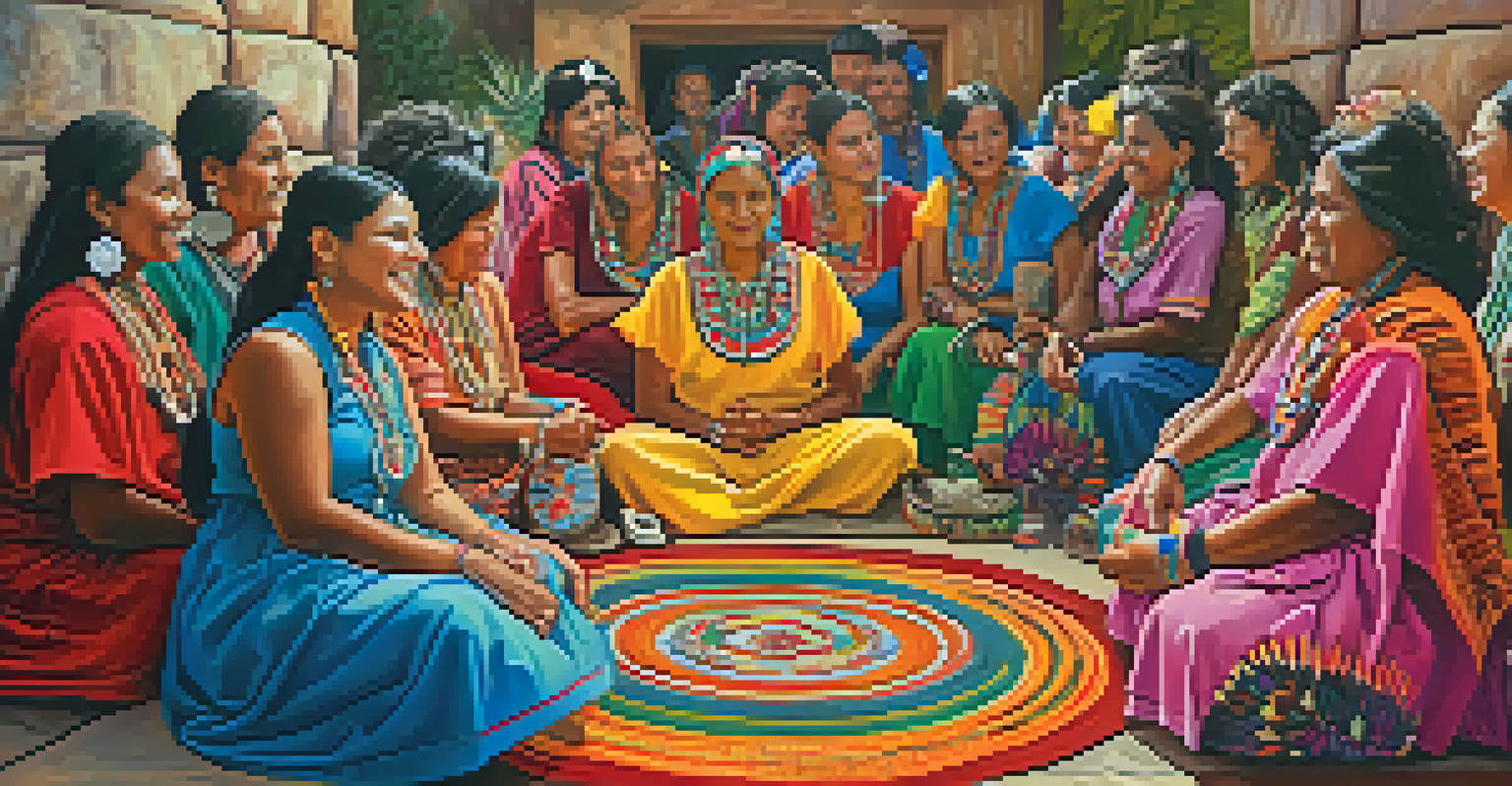The Role of Women in Peyote Rituals: A Cultural Perspective

Understanding Peyote Rituals and Their Cultural Significance
Peyote rituals hold deep cultural and spiritual significance for many Indigenous communities, particularly in North America. These ceremonies, which often involve the consumption of the peyote cactus, are traditionally used for healing, spiritual guidance, and communal bonding. The rituals serve as a connection to ancestors and the natural world, fostering a sense of identity and purpose among participants.
Women are the backbone of many Indigenous cultures, providing strength, wisdom, and nurturing that sustains the community's spirit.
While peyote rituals are often seen through the lens of male participants, it is essential to recognize the vital role women play in these ceremonies. Women often act as facilitators, healers, and spiritual leaders, contributing their unique perspectives and experiences. Their involvement is not just complementary; it is integral to the wholeness and authenticity of the ritual.
Furthermore, the participation of women in these rituals challenges stereotypes and highlights their strength within the community. By understanding their roles, we can appreciate the richness of these traditions and the important contributions women make in preserving and evolving cultural practices.
Historical Context of Women's Roles in Peyote Practices
Historically, women have been central figures in peyote rituals, even before the modern recognition of these practices. Many Indigenous cultures traditionally assigned specific roles to women in spiritual and healing contexts, acknowledging their intuitive and nurturing qualities. This historical backdrop sets the stage for understanding contemporary practices and the ongoing significance of women's involvement.

The evolution of peyote rituals has reflected broader societal changes, including the roles of women. As communities faced external pressures and changes, women often became the keepers of tradition, ensuring that cultural practices endured. Their leadership in these rituals serves as a testament to their resilience and dedication to their heritage.
Women's Vital Roles in Peyote Rituals
Women serve as spiritual leaders and healers, playing essential roles in the authenticity and effectiveness of peyote ceremonies.
By examining the historical context, we can see how women's contributions have shaped the practices we recognize today. This understanding not only honors their past but also empowers current and future generations of women within these cultural spaces.
Women's Spiritual Leadership in Peyote Ceremonies
Women often take on spiritual leadership roles during peyote ceremonies, guiding participants through the rituals with their knowledge and intuition. Their ability to connect deeply with the spiritual aspects of the ceremony allows for a more profound experience for all involved. This leadership is not just about authority; it embodies a collective wisdom that nurtures the spiritual journey of the community.
The future of our traditions depends not only on preserving the past but also on embracing the voices of women who lead the way forward.
In many cases, women serve as facilitators, helping to create a safe and welcoming environment for participants. Their presence encourages open dialogue and connection, which is essential for the healing aspect of the ritual. This nurturing role is vital, as it fosters trust and comfort among attendees, allowing for genuine spiritual exploration.
Additionally, women's spiritual leadership often integrates teachings and practices passed down through generations. This connection to ancestry and tradition enriches the ceremonial experience, emphasizing the importance of women's roles in maintaining cultural continuity and resilience.
The Healing Practices of Women in Peyote Rituals
Healing is a cornerstone of peyote rituals, and women frequently take on the role of healers within their communities. Their understanding of herbal medicine and traditional healing practices enhances the therapeutic aspects of the ceremony. This knowledge allows them to address not only physical ailments but also emotional and spiritual challenges faced by participants.
Women often use their intuitive skills to identify the needs of individuals during the rituals. Through prayer, song, and sacred offerings, they create a holistic healing environment that resonates with the participants' experiences. This approach underscores the importance of emotional and spiritual well-being, offering a balanced perspective on health.
Historical Context Shapes Practices
The historical significance of women's contributions to peyote rituals highlights their enduring influence on cultural practices today.
The healing practices led by women reflect a deep commitment to community welfare. By nurturing the well-being of individuals, they contribute to the overall health of the community, reinforcing the interconnectedness of all members and the importance of collective healing.
Contemporary Challenges Facing Women in Peyote Traditions
Despite their significant roles, women in peyote rituals face contemporary challenges that threaten their participation and leadership. External pressures, such as legal restrictions and cultural appropriation, can undermine the authenticity of these practices. Additionally, societal shifts have sometimes led to a devaluation of women's contributions in spiritual spaces.
The rise of modernity and globalization also poses challenges, as younger generations may struggle to connect with traditional practices. It becomes imperative to find ways to engage and educate these younger members about the importance of women's roles in peyote rituals. Fostering this connection can help ensure the continuity of these traditions.
Addressing these challenges requires a collective effort to advocate for the rights and recognition of women in peyote rituals. Empowering women to reclaim their rightful place in these traditions can lead to a richer, more inclusive cultural narrative that honors the past while looking towards the future.
Celebrating the Contributions of Women in Peyote Rituals
Recognizing and celebrating the contributions of women in peyote rituals is essential for honoring their legacy within these traditions. This celebration can take many forms, from community gatherings that highlight women's stories to educational programs that teach the significance of their roles. By elevating women's voices, we create a more inclusive narrative that reflects the diversity of experiences within the community.
Celebrating these contributions also fosters a sense of pride and empowerment among women. It encourages them to continue their involvement and leadership in peyote rituals, knowing that their efforts are valued and appreciated. This acknowledgment can inspire younger generations to engage with their cultural heritage and assume active roles in preserving their traditions.
Addressing Modern Challenges
Contemporary challenges, including cultural appropriation and societal shifts, threaten women's participation in peyote traditions, necessitating advocacy and education.
Ultimately, celebrating women's contributions enhances the richness of peyote rituals. It reinforces the idea that these ceremonies are not solely about individual experiences but are a collective journey that relies on the wisdom, strength, and resilience of all participants, particularly women.
The Future of Women's Roles in Peyote Rituals
Looking ahead, the future of women's roles in peyote rituals is filled with potential for growth and transformation. As communities continue to navigate the complexities of modern life, there is an opportunity to reinvigorate traditional practices while honoring the past. This evolution can lead to more inclusive and diverse representations of women's roles within these rituals.
The integration of contemporary issues, such as environmental stewardship and social justice, can also shape the future of peyote rituals. Women can play a pivotal role in addressing these challenges, using their voices and leadership to advocate for change within their communities. Their unique perspectives can help bridge traditional practices with modern values, creating a holistic approach to spirituality and cultural preservation.

By fostering intergenerational dialogue and collaboration, communities can empower women to take on even more significant roles in peyote rituals. This collaborative spirit not only strengthens the cultural fabric but ensures that the wisdom of women continues to guide future generations in their spiritual journeys.